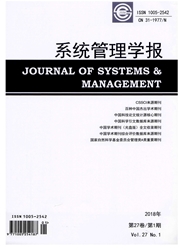

 中文摘要:
中文摘要:
当资金约束的供应商出现供应风险时,制造商如何在提供预付款和提高产品价格之间做出选择是有待研究的问题。分析了预付款融资模式下,供应商的最优生产决策及制造商的最优预付和定价决策,研究了供应商的自有资金对预付款融资与产品定价的影响。研究发现,当供应商的自有资金较多时,预付款融资可以使供应商生产多于无资金约束下的产量,而制造商会对产品定低于无资金约束下的价格;当供应商的自有资金较少时,制造商应尽可能地提高产品的价格,以弥补供应商资金约束对自身的影响。最后,通过数值分析验证了本文的结论。
 英文摘要:
英文摘要:
In a supply chain, when the supplier with capital constraints cannot supply components as usual, the manufacturer's decision on how to deal with the situation is a key research problem, i. e. , whether providing advance payment or raising the purchase price? In this paper, the supplier's optimal production decision and the manufacturer's optimal financing and pricing decisions are analyzed with advance payment. The impact of the supplier's initial capital on the financing and pricing decisions is studied. It is shown that when the supplier has a large capital level, the advance payment financing can drive the supplier's production quantity higher and the manufacturer's product pricing lower than that when the supplier does not have a capital constraint. When the supplier has a low capital level, the manufacturer should raise the product price as high as possible to compensate the impact of the supplier's capital constraints on his profit. The numerical results demonstrate the impacts of the advance payment, and highly support the analytical results.
 同期刊论文项目
同期刊论文项目
 同项目期刊论文
同项目期刊论文
 期刊信息
期刊信息
